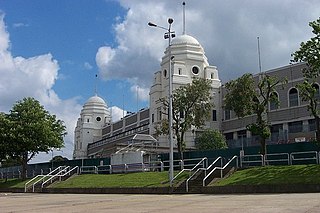
The 1934 British Empire Games were the second of what is now known as the Commonwealth Games, held in England, from 4–11 August 1934. The host city was London, with the main venue at Wembley Park, although the track cycling events were in Manchester. Seventeen national teams took part, including the Irish Free State.

A wave pool is a swimming pool in which there are artificially generated, reasonably large waves, similar to those of the ocean. Wave pools are often a major feature of water parks, both indoors and outdoors, as well as some leisure centres.

Wembley Park is a district of the London Borough of Brent, England. It is roughly centred on Bridge Road, a mile northeast of Wembley town centre and 7.6 miles (12 km) northwest from Charing Cross.
At the 1948 Summer Olympics in London, 11 swimming events were contested, six for men and five for women. All swimming events took place at the Empire Pool. There was a total of 249 participants from 34 countries competing.

Bring Me the Head of Yuri Gagarin is a live album by English rock group Hawkwind released in 1985 consisting of a performance at the Empire Pool, Wembley on 27 May 1973. This is a poor sound quality audience recording licensed by Nik Turner. The recording has been released numerous times under different names, with different covers and bundled into box sets.
The Wembley Lions were an English ice hockey team.

The Wembley Monarchs were an ice hockey team in the United Kingdom. They were founded in 1929 as the Grosvenor House Canadians, transferred to Wembley Canadians for the 1934-35 season and became the Monarchs in 1936. The team played in the English League 1931-35, 1936–37 and in the English National League 1935-36, 1937-50.
The Wembley Championships was a men's professional tennis tournament held from 1934–1990 with some periods of inactivity in between and is considered as a part of the professional grand slam from 1927–1967 until the advent of the open era. Ken Rosewall's and Rod Laver's six singles titles are the record for this event. The tournament only had a men's draw.
The 1982 John Player All England Open was the 72nd edition of the All England Open Badminton Championships. It was held in 1982, in Wembley, London. During an International Badminton Federation meeting in London on March 23, 1981 it was agreed to re-elect the twenty members of the breakaway World Badminton Federation. This included China which consequently resulted in some of the world's top players returning to compete in the All England Championships.

Cardiff International Pool is an Olympic-sized swimming pool built as a public-private funded project, with a partnership between Cardiff Council, OLLC which is a partnership between Orion Land & Leisure and Explore Investments (developers) and Parkwood Leisure (operator). Parkwood won the contract to manage the facility for 10 years, with a projected turnover of £2.5m each year.
Sir Arthur 'Ginger' Elvin was a British businessman who was best known as the owner and operator of Wembley Stadium, London.
The men's 1500 metre freestyle event at the 1948 Olympic Games took place between 5 and 7 August, at the Empire Pool. This swimming event used freestyle swimming, which means that the method of the stroke is not regulated. Nearly all swimmers use the front crawl or a variant of that stroke. Because an Olympic size swimming pool is 50 metres long, this race consists of 30 lengths of the pool.
The men's 4×200 metre freestyle relay event at the 1948 Olympic Games took place on 2 and 3 August at the Empire Pool. The relay featured teams of four swimmers each swimming four lengths of the 50 m pool freestyle.
The women's 4×100 metre freestyle relay event at the 1948 Olympic Games took place on 4 and 6 August at the Empire Pool. This swimming event used freestyle as a relay, with swimmers typically using the front crawl. Because an Olympic size swimming pool is 50 metres long, each of the four swimmers completed two lengths of the pool. The first swimmer had to touch the wall before the second could leave the starting block; timing of the starts was thus important.
At the 1930 British Empire Games in Hamilton, Ontario, Canada, there were two aquatics disciplines – swimming and diving. There were four diving events contested and eleven swimming events. The aquatics programme included the only women's events of the games.

A total of twenty-five sports venues were used to host the events of the 1948 Summer Olympics in London, United Kingdom. For the first time in the history of the modern Olympic Games, the diving, gymnastics, swimming, and water polo competitions were held indoors. These Games have since been nicknamed the "Austerity Games" for the tight control of costs at a time when the host nation was still under rationing, which resulted in a total expenditure of around £750,000. All of the venues were already in place and required only temporary modifications. The organizing committee decided not to build an Olympic Village; instead, foreign athletes were housed in makeshift camps at military bases and colleges around London, while local athletes were told to stay at home. Despite these measures, the combined venues of the 1948 Summer Olympics recorded the highest attendance figures for a Games at that time.
The 1938 World Table Tennis Championships were held in London from January 24 to January 29, 1938. The pool stages were held at the Royal Albert Hall with the finals at the Wembley Empire Pool and Sports Arena.
This page is based on this
Wikipedia article Text is available under the
CC BY-SA 4.0 license; additional terms may apply.
Images, videos and audio are available under their respective licenses.









